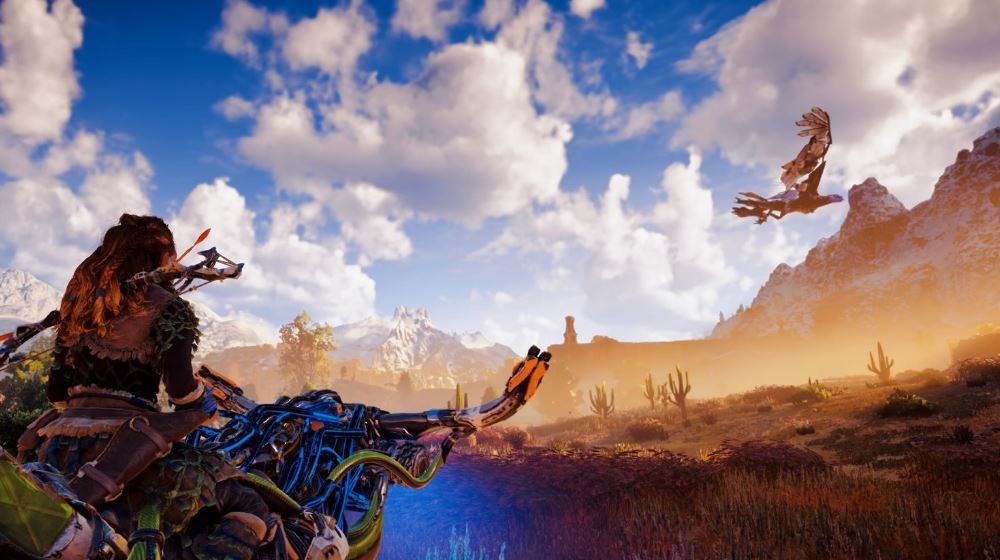The sun is low in the skies when I see my prey. I scout out the sun-blasted environment and formulate my plan. My resources are running low so I have to put my machinations on hold while I go harvesting for wire. By the time I return, the moon is behind me, casting beams of light onto the Thunderjaw, my quarry. I put down my tripwires, craft my arrows, and find a spot to begin our dance. After ten minutes of intense combat and quick thinking, I fell my prey with his own disc launcher. As I revel in my hard won (but not too hard) victory, a notification appears on my television screen. “All Combat Machines Killed” it tells me. This is where the game lost me.
There are many things that can be said in praise of Horizon Zero Dawn, from its enchanting post-apocalyptic setting, to its fantastic visuals, its tight controls, and its near-flawless performance. However, when you peek under the hood of this luxury car, I feel it lacks the horsepower to truly compete in the gaming landscape that is 2017. When I killed that Thunderjaw and that trophy appeared on my screen, I felt that I had experienced the most that this game had to offer, which was an experience I saw at E3 in 2015. The game lives up to that gameplay promise, but it doesn’t go any further. What you see on the front of the box is the peak of what this game can offer. By telling me that I have now killed all the major enemies before hitting level 25, I now have nothing to look forward to gameplay wise. Beyond that, the stories and activities contained within this beautiful open world are nowhere near compelling enough compared to its contemporaries and predecessors to make this feel like a truly rich experience. When I think of Horizon Zero Dawn’s development, I think of looking online for a recipe: I go to the store and buy those ingredients and make an adequate dish, but I add no flair or identity of my own to truly make it stand out.
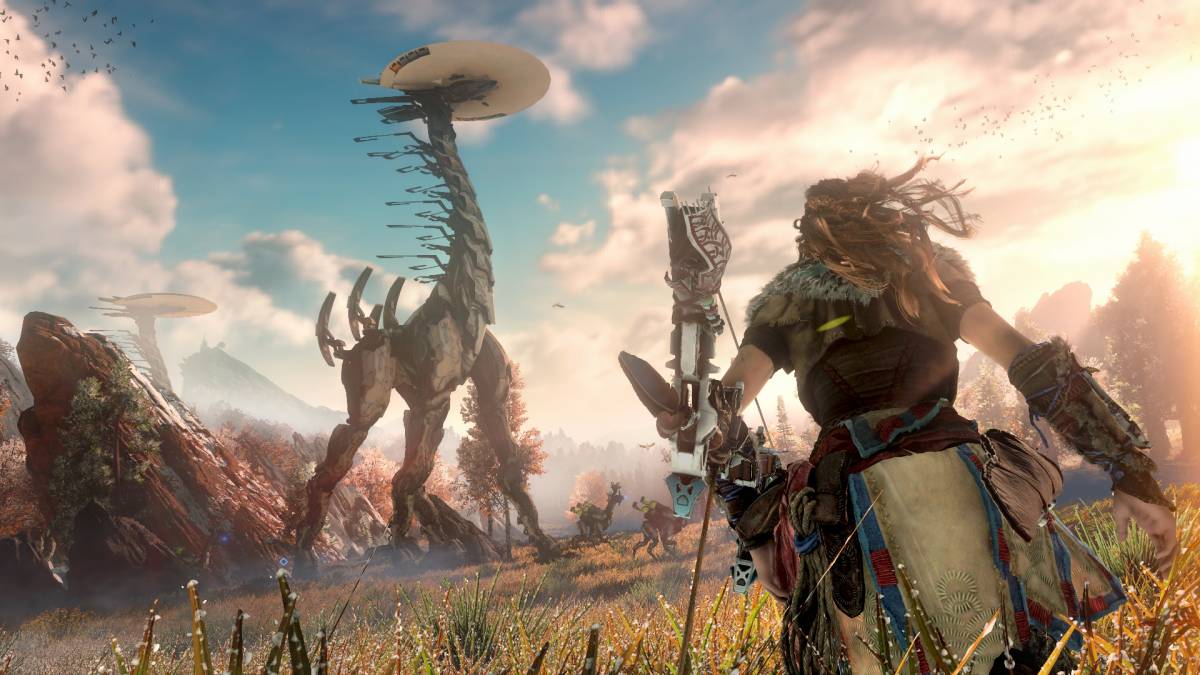
One of the first things I grabbed onto in this game was not something I was expecting. There was a dialogue tree very akin to Bioware’s Mass Effect and Dragon Age games. It even has corresponding icons (Brain, Heart, and Fist) accompanying dialogue options to give the player an inclination of the tone main character Aloy speaks in. This excited me, but I had caution because “Player Choice” was not something touted in the promotional material for this game. A quick search online revealed that the choices you make in these moments do not impact the story in any way. While I appreciate being able to feel more immersed in Aloy’s journey, (and I feel like no matter how you progress through these trees the dialogue flows naturally) the whole exercise seems futile and a poor use of resources. If my choices don’t matter in the end, or even from quest to quest, it feels like a half-hearted, daresay lazy, attempt to make the story more personal.
It’s a situation where I feel like Guerilla Games was looking at what the CD Projekt Reds and Biowares of the industry were doing and felt they had to meet that standard but could not fully commit in the same way that those developers did to make their systems integral and special to the overall product. The Witcher 3’s “Where the Cat and Wolf Play” is a textbook example on how to do player choice right despite that side quest not having a big impact on the main story of the game. The choices you make in that quest not only inform the player about Geralt but inform the player about them themselves. I’m not saying you need to meet that high watermark, but it’s a great example of what giving the player choice adds to the experience. Either commit to dialogue trees or don’t, and use those freed up resources to polish and enhance the core game.
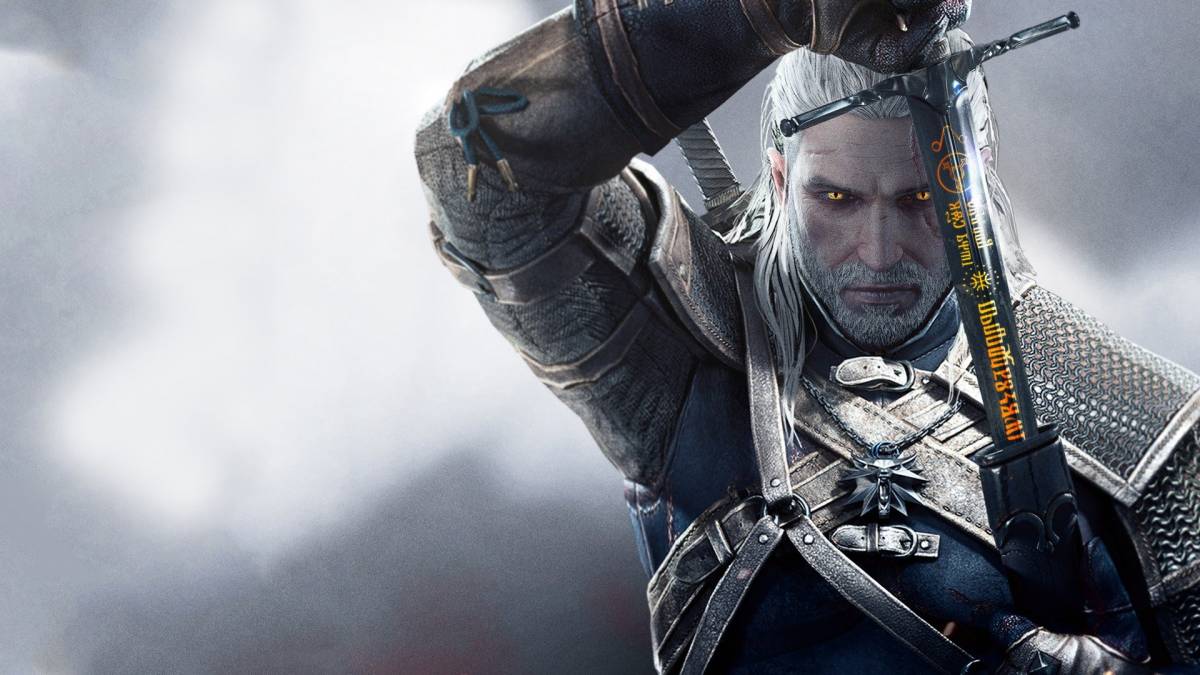
One of the core elements of Horizon Zero Dawn’s game is its open world. I should begin by saying that I find the setting itself magical in a way the Fallout games never grabbed me. This post-apocalypse feels so real in that when I walk into an abandoned city or stadium, I think to myself “This is probably what a city would look like 1,000 years in the future without any maintenance.” As opposed to Fallout’s constant societal stagnation of salvaging and repurposing old-world junk, humanity in Horizon has moved on and is building completely new things and new cultures.
The open world itself is effective in terms of gameplay; I don’t have to compare this to the Witcher to get my point across. I can use games such as Grand Theft Auto V, Skyrim, or Final Fantasy XV to illustrate how this game does not hold up well. I can even cite older titles such as Red Dead Redemption or Fallout: New Vegas. When I first saw Horizon’s full map for the first time, I saw a pattern of progression. You start in Mother’s Cradle, and then are funneled up north, and then funneled again to the west. I feel like this is a cardinal sin in an open world game. In most of the examples I listed, once you make it through the tutorial or introduction, you are set free in this world and there are no real boundaries in terms of where you can go on the map: it’s up to you to decide where your character will journey to next. Horizon strings you along from area to area with natural boundaries and a dearth of activities and quests.
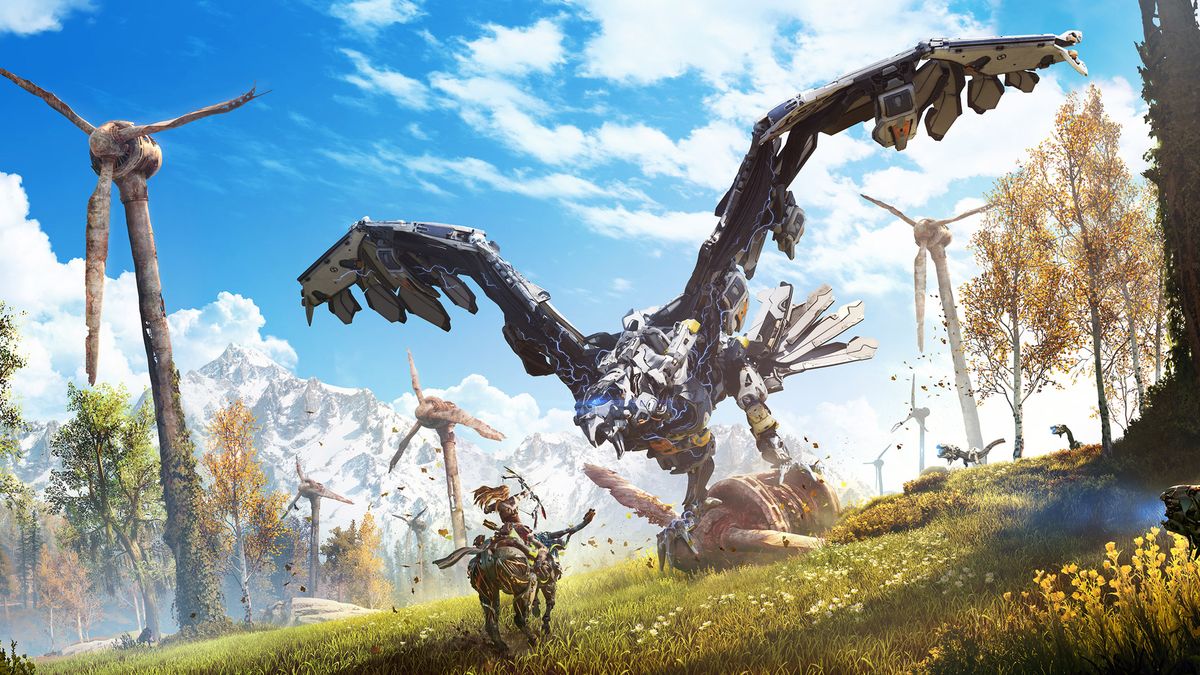
There are several gameplay loops in Horizon Zero Dawn in the roughly 30 hours I have played. The first is hunting machines, the second is clearing out an area of bandits, third is following a purple line via this game’s version of Witcher Senses, and the fourth is gathering resources. Horizon’s quests inevitably fall into these four categories every time I have started one. A quick note to developers is to never list any content in your game as “Errands” as Horizon Zero Dawn boldly does in its quest menu. You are expressly saying that this is filler content that has no real purpose other than to fill up the game, and errands can be synonymous with chores. That does not sound fun to me.
I became interested when I stumbled onto a quest where I had to retrieve a stolen sword for an aristocrat. The story unraveled to be deeper than it originally appeared, and seemed a perfect opportunity to employ a player choice mechanic in that you have to decide who to help, but in the end it devolved into clearing out a bandit camp. There is nothing to break up the monotony of this gameplay loop (and it does get to be monotonous) and the gameplay is nowhere near engaging enough to keep its hooks in. A game like DOOM 2016 is so much fun to play and its mechanics feel so good that the game rewards exploration with new combat encounters. Nioh’s combat is so rewarding and so thrilling I have to do every side mission because I want to feel that constantly and get the most out of my experience. In Horizon, there is only so many times I can run into a pack of Watchers and get instant kills by shooting them through the eye before it stops feeling rewarding and becomes tedious.
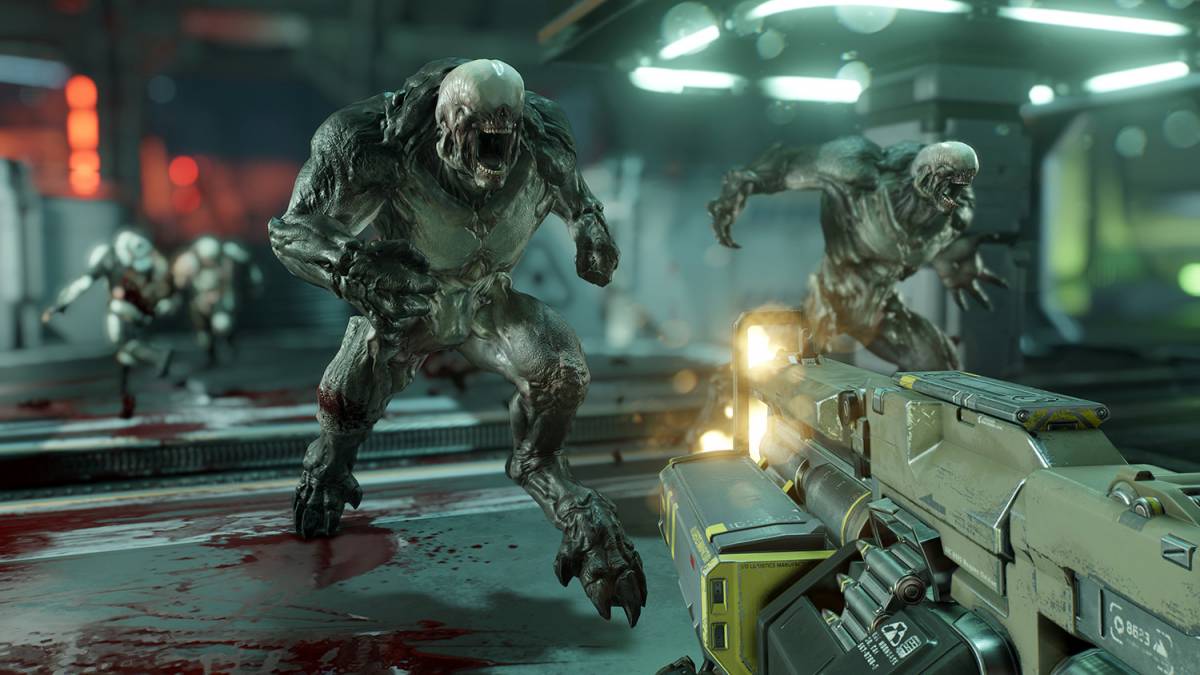
Enemies respawn quickly and consistently, eliminating any feeling of progress. It becomes very tiring traveling the world and running into the same enemies every few yards and them instantly aggroing on you. And if you really try to dig into all the optional content this game provides, like I did, it makes a seemingly expansive open world an exhaustive one. Rapidly. You run into the same Watchers and Broadhorns from the first area in the later areas and no new gameplay elements are introduced. Running from place to place feels like another chore, and when I fast travel, I am now bypassing the game’s visuals, which are arguably the game’s greatest strength. This deficiency could be compensated for with a way to break up the tedium. I need that breath of air where I can take a break from what I’m currently doing and go fishing, or play cards, or go horse racing. I need that mix-up, and it’s what I expect in my open world games in 2017. Let me reset before I get burned out. Horizon Zero Dawn has no content like this, so you are pigeonholed into doing the same four things. This makes sense in a shorter, more linear game, but not in an open world one. It’s an open world, as in a place you want to exist in.
Again, even with those lacking elements, the game could still succeed in its goals by telling compelling stories. Yet all the stories this game aims to tell seem to begin with tracking someone or something and ending with combat with machines or bandits. The machines begin to become recycled quickly and fail to introduce new ways to play as a result. I have noticed that “boss” bandits seem to all be using the same heavy weapon and lack any challenge when it comes to defeating them. The main quest fairs better, but not by much. I have now done two main quests where a character has gone missing or was presumed dead and it is revealed that they aren’t and you have to find them. It feels like what could have been a great story sabotaged and spread far too thin to compensate for in an open world, whereas a tight focus and trimming the fat would have serviced it better. There are some good characters and ideas here narratively, but the game itself is not engaging.
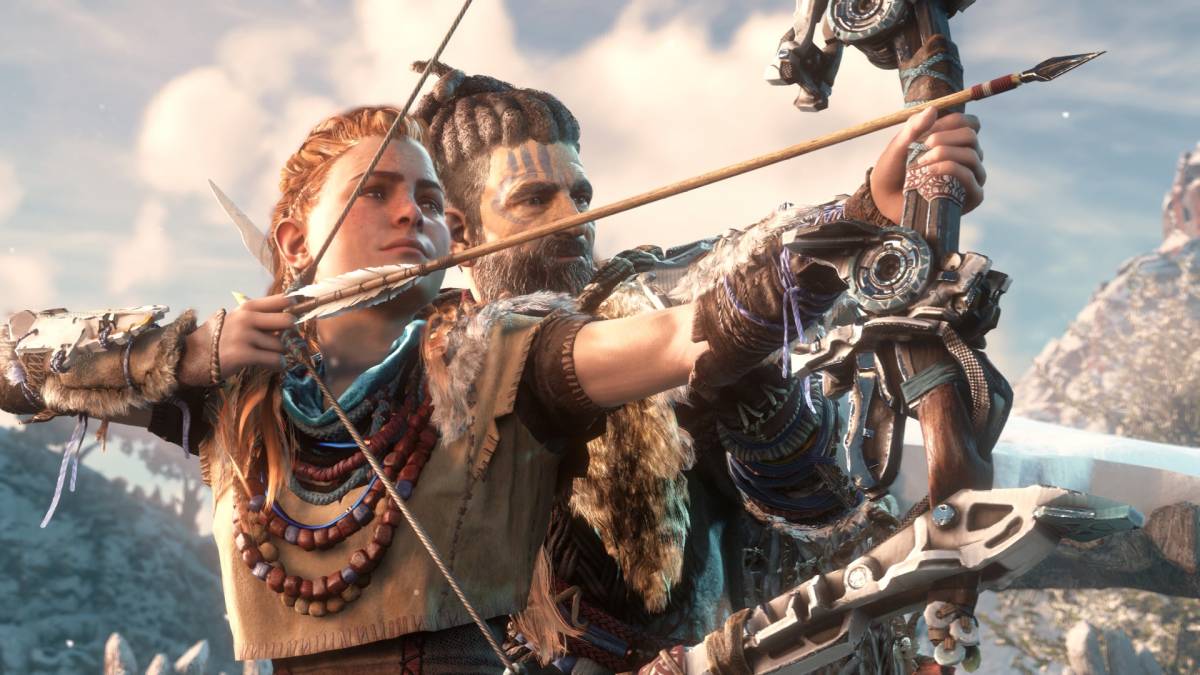
The open world also removes the excitement of discovery in several ways. Another early disappointment was how the game would mark Tallnecks (think towers in an Ubisoft game) and cauldrons (think dungeons in an Elder Scrolls game) on the map. This eliminates the thrill of discovering these things and makes reaching them feel like an objective because hey, they’re right there on the map and compass, you will be there in 792 steps. While there are some insightful logs and diary entries you can pick up throughout the world, they are sparsely and illogically placed and feel again like another ”checklist” approach to an open world. I found a log about what seemed to be a futuristic Fantasy Football league in a ravine in the desert for no lore or environmental purpose; it was just there in the wilds with no context. In Skyrim, a corpse in a dungeon tells a story. What a person has in their inventory tells a story. What people do with themselves day to day tells a story. These are all things a player can discover and piece together for themselves in an organic way and they can even react dynamically to you. In Horizon Zero Dawn, NPCs don’t have any kind of reaction when you run full speed into them and attacking them will show your weapon clipping right through them inoffensively. This game decides when you can and cannot do things and focuses more on the bigger picture than the details, and that makes for a very boring open world. Despite the incredible visuals, all of this feels positively prehistoric.
Cauldrons attempt to have an air of mystery about them so when I first approached “Cauldron Sigma”, I got excited. This seemed to be where the game would finally get good. It was what the developers were holding back on revealing. The dungeon was visually fantastic, but extremely straightforward in its layout, filled with non-puzzles and the same types of combat encounters I had in the open world. This culminated in a “boss” encounter which was an enemy I encountered in the open world, the Bellowback, and it did not seem demonstrably more powerful. Upon completion, the modification I received didn’t feel like an adequate reward, but then again the challenge wasn’t really there in the first place. I figured that this may be just a “tutorial” cauldron and the next one would be more formidable. The next cauldron, Rho, was equal in disappointment.
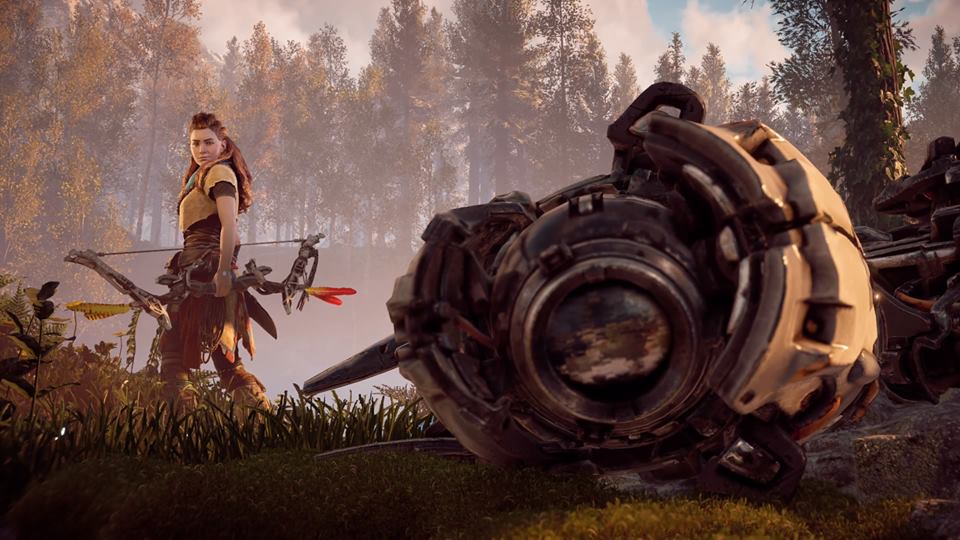
It offered up a new mechanic wherein hitting a gear inexplicably changes its rotation, but it does not use this mechanic in any interesting ways, just very straightforward environmental navigation. By the time I reached the end of this one, the big challenge was facing two different common enemies at once. Again, this dungeon is offering me nothing new conceptually or challenge-wise, and I feel no real achievement or progress in clearing them. A neat thing to do would be to have it so that once I clear these cauldrons, robots stop respawning in that area (for lore reasons), but it misses this opportunity. I am aware that completing these dungeons gives you the ability to control more types of enemies, but I will address that later on. The unfortunate thing is that these mediocre jaunts are still the high point of the game because they do break up the repetition, yet there are only four of them. They aren’t particularly intensive experiences and there are not enough of them to come into their own mechanically as a selling point. Cauldrons are a great idea, but underutilized. Despite their visual splendor, they fail to be as rewarding as a Zelda dungeon, or even a good Elder Scrolls dungeon.
One strength of RPGs is the ability to customize your character to be effective in different areas, thus shaking up gameplay and maybe even encouraging multiple playthroughs. There just aren’t many ways to play Horizon, a game touted as an Action RPG. There are three skill trees in Horizon Zero Dawn: Prowler, Brave, and Forager. Prowler is stealth-based, Brave is combat-based, and Forager is for resource management. The issue here is that by investing in one tree, you are not making a commitment to a certain playstyle, as all of these skills are easily attainable throughout the game without needing to grind. Spending a skill point is not a big decision to agonize over. There are no stakes to leveling up and that robs it of any excitement. Furthermore, the skills you unlock themselves are derivative, almost boring. They range from things I feel like Aloy should be able to do from the start like backstabs, or pulling a guy off of a ledge, to flat increases in crafting amounts and time one can spend aiming her bow in slow motion. Some of these skills offer a nominal difference, such as being able to reload faster in slow motion or being stealthier when not in tall grass. This leads to an ARPG without “builds.” Characters will end up not differentiating between playthroughs, and it accelerates the feeling of gameplay exhaustion as a result. The same way the open world fails to mix things up, so does the player skills.

Equipment is another tool the player has at their disposal in Horizon Zero Dawn. The player is given access to all sorts of tripwires, slingshots, and weapons that can trap enemies, bait them somewhere, or tear off armor. The game so far has not thrust me into an encounter to where it’s forcing me to get creative with my tools. I can comfortably get through every enemy purely with my bow and well timed dodges. It should be noted that I am pretty well practiced in timing dodges, having just gotten off of a Nioh kick, and also that I am playing on the default difficulty. I feel as though that if I’m finding the game this easy on the developer intended gameplay mode, then something went amiss with their encounter designs. I’m only challenged to use the majority of my equipment to get awards in hunting challenges, and after I have completed them, I do not feel compelled to use the same strategies again because a bow and trip wire combo is just too effective.
As for overriding robots and making them your allies, this seems to have a marginal gameplay benefit due to them not seeming to truly distract other enemies. They don’t draw other robots’ ire like you do, despite them generally doing a lot more damage. It seems very hit or miss and unreliable. In one encounter with two Sawtooth, I hacked one and had it attack the other, but the latter one would just ignore him and continue to come after me. Incredulously, the quest required me to kill the one I had hacked anyway despite no longer being a threat to the folks I was rescuing. The only tangible benefit of overriding enemies seems to be to procure a mount, of which there are only several. While riding a mount thankfully cuts down travel times, the game does not go the obvious route and let me soar the skies on a Stormbird or rush into a base on the back of a Thunderjaw. The imagination on display with these gameplay mechanics is very underwhelming. There’s just not a lot there to really dig into, experiment with, or most importantly, enjoy.
Horizon Zero Dawn is an extremely competent game, but I would hesitate to call it robust. It’s beautiful and bombastic and has incredible audio design and polish. I have never played a game that looked so great and ran so smoothly at the same time. It is a technical achievement in that regard and should be lauded as such. But as a gameplay experience, it lacks vision. It lacks that hook that keeps you thinking about playing it while you are at work. After a certain point, Horizon Zero Dawn leaves you nothing more to look forward to. For all its visual bluster, it runs out of tricks well before the end. I’m left feeling hollow about all the missed opportunities that could have been something great. It just cannot compare to the games it draws influence from, some having been released over five years ago. Oddly enough, I think a lot about Donkey Kong 64 when playing this game.
Donkey Kong 64 was an ambitious game that devolved into becoming a series of checklists so tedious and exhaustive that it can be argued that it contributed to killing the “collect-a-thon” genre. I worry a similar fate will befall Horizon Zero Dawn and other games that follow Guerilla’s approach to open world gameplay. If the market becomes oversaturated with mediocrity, then that damages the entire ecosystem of the genre. Maybe open world games will no longer be popular and we will consequently see less of them. A decent foundation has been laid, and I hope Guerilla Games does not get complacent with the praise this game has (inexplicably) had heaped upon it. I hope they challenge themselves to do better next time, or maybe even restructure the game and try for a more streamlined approach akin to Uncharted or Tomb Raider that can deliver an “E3 moment” at a consistent pace. As it stands, I feel like Horizon Zero Dawn lacks any staying power in the modern gaming landscape, and rightfully so. We as consumers should demand more from our games than what Horizon Zero Dawn has to offer, regardless of how pretty it looks.
Some of the coverage you find on Cultured Vultures contains affiliate links, which provide us with small commissions based on purchases made from visiting our site. We cover gaming news, movie reviews, wrestling and much more.


